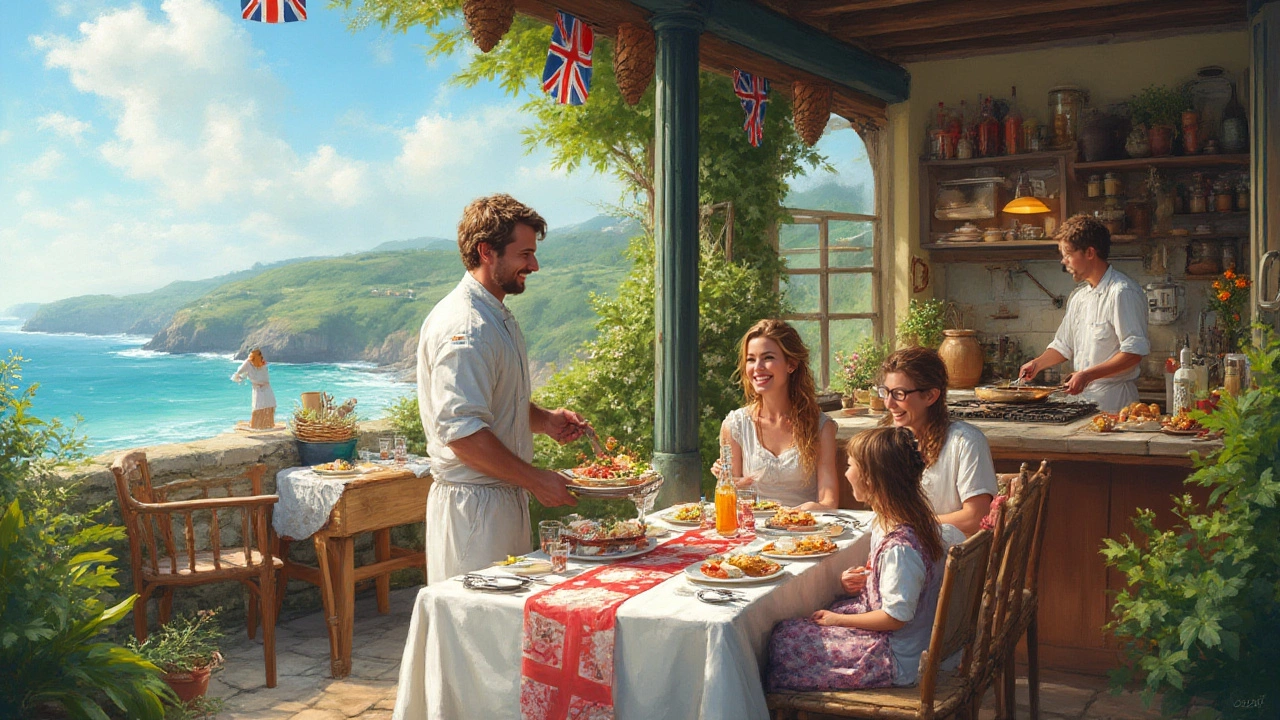Catering vs. Self-Catering: What’s Best for Your Next Getaway?

If you’ve ever planned a trip and ended up stuck between a glossy hotel with waiters on standby and a cute cottage with a stovetop begging you to cook, you’re not alone. The lines between catering and self-catering can get surprisingly blurry. People sometimes book the wrong thing by accident – my friend once arrived at a remote Scottish cabin, bags full of sandals but zero groceries, only to realize the nearest shop was five miles of sheep-studded hills away. When you know exactly what each term means, you can skip the stress, go in prepared, and end up with a holiday that fits you just right.
What Does 'Catering' Actually Offer?
When you book a catered stay, you’re saying yes to someone else handling your meals. In hotels, resorts, and fine country houses, this usually means breakfast, lunch, dinner, and sometimes snacks—all rolled into the price. It’s like a culinary autopilot. You stroll down, make your pick from a menu or a buffet, and tuck in without ever having to peel a carrot. Places like all-inclusive hotels and some eco-friendly retreats thrive on the catered model because so many guests love being pampered. For big celebrations—think weddings or milestone birthdays—professional catering turns eating into an event, with every detail managed for you.
Some catered properties go beyond everyday eats. I remember a small family-run inn in Cornwall that prided itself on packed lunches for hikers. Hot coffee and thick sandwiches for a cliff walk? Instant happiness. You’ll often find themed dinners (medieval nights, gourmet tastings, local seafood feasts) thrown into the mix, especially at resorts. It’s more than just food; it’s an experience and a way to taste the destination. Chefs love to show off local flavors, so you might discover a favorite dish you’d never encounter at home.
But there’s another perk: you’re off the hook for dishes, shopping, and cleanup. I’ve heard from frequent business travelers that this convenience is priceless, especially on tight schedules. Even families juggling tired kids and fussy eaters appreciate handing over the cooking. Sometimes, catered accommodations start to blur into personalized pampering. Some boutique hotels let you say what you’d like in advance, so you can skip the mushrooms and double down on dessert. Allergy-friendly? Vegan? Keto? Chefs can adapt, which is a lifesaver for many guests.
Not every catered stay is all-or-nothing. Bed and breakfasts often serve homemade morning spreads but leave lunch and dinner to you. Country house hotels might tempt you with a swoony three-course meal and still have a ‘light bites’ menu for lazy afternoons. Plenty of mid-range hotels include complimentary breakfast (croissants, toast, and all the tea you can drink) to start your day, but ask you to find your own dinner. So if you see “catering” mentioned, dig into the details. Is it just breakfast, is it a daily feast, or something in between?
Self-Catering: Total Freedom or Full Responsibility?
Flip the coin, and self-catering means you’re in charge of every bite. You get your own kitchen or at least a kitchenette—think apartments, villas, and, of course, all those adorable self-catering cottages that are scattered through the Lake District and Cornish coast. This isn’t just about cost-saving (though let’s not kid ourselves, it often is). Self-catering is about freedom. Eat what you want, when you want, and how you want. Want pancakes for dinner? No one’s judging. Craving midnight cheese toasties? The kitchen is yours.
Self-catering makes travel with specific diets, allergies, or picky kids so much easier. For families, it’s a stress-buster. Trust me, I’ve seen the relief on parents’ faces when they realize there’s a microwave, toaster, and enough plates for everyone. Not to mention, you get to dive into the local food scene—buying fresh bread from the corner bakery, sampling regional cheeses, and testing out tiny supermarkets can be one of the highlights. There’s something grounding and satisfying about mixing up your own gin and tonic as the sun sets, feet up in your temporary home. Gareth, my spouse, turns into a breakfast maestro on these trips—scrambled eggs with whatever happens to be in the fridge: chorizo, parsley, stubborn tomatoes.
But let’s not sugarcoat the flip side: self-catering means shopping, prepping, and cleaning. There’s no magic fairy whisking away your dirty pans, and sometimes holiday kitchens can be…inventive. I’ve encountered mystery gadgets and missing corkscrews more than once (pack your own is my tip). You’ll want to check if basics are included: salt, pepper, oil, coffee. Often, cottages provide a starter set but expect you to restock as you go.
That independence can turn bittersweet after a long, blustery walk or if it rains for a day straight. Sometimes you don’t want to cook. For longer stays or big groups, sharing out shopping and meal duties is key. Plenty of travelers pair self-catering with trying local restaurants—eat in for breakfast and snacks, go out in the evening, and you get the best of both. Or book a one-off local chef for a celebration meal without ditching the kitchen altogether.

The Financial Side: Which Saves and Where?
The instinct is to assume self-catering wins every time on cost, but let’s look closer. Catered stays show their costs upfront. That price tag might look steep at first, but remember it usually covers multiple meals, service, ingredients, and sometimes even drinks or entertainment. For places where eating out is expensive—think remote Scottish islands or ski resorts—paying upfront for all your meals can actually save you money (and spare you countless mileage on a wet afternoon in search of a bite to eat).
Self-catering, on the other hand, gives you total control over your food budget. Head to the local supermarket, cook what you want, and you can keep spending in check. This especially helps families and big groups spread costs and avoid unpredictable restaurant bills. But be honest: shopping for a full fridge, buying pantry staples, and snapping up those irresistible local treats can quickly add up. Supermarkets in holiday hotspots sometimes charge ‘holiday prices’ too, and fancy food souvenirs are tempting.
One often-overlooked expense for self-caterers? Time. Every hour you spend planning meals, shopping, and cooking is time out of your holiday. Is that worth saving some cash? That depends on your vibe. If you get a happy buzz from prepping a picnic and popping down to local markets, it feels like part of the adventure. If you’d rather be poolside with a cocktail, consider what outsourcing meals is worth to you.
Another money-related twist: there are lots of hybrid setups springing up. Places that offer self-catering units but let you tack on breakfast, dinner, or even a fridge pre-stocked for your arrival. Sometimes these cost a bit more, but they’re pure convenience after a long drive. Some property owners even partner with local cafes to give guests discounts—a sneaky way to sample area flavors without paying top restaurant prices every night.
How to Choose: Personality, Priorities, and the Best Fit
If you thrive on order and “being looked after,” catering is your dream setup. You’ll have more downtime and fewer decisions. It’s especially great if you’re traveling for business, romance, or special occasions. Don’t want to lift a finger or deal with unfamiliar gadgets? Book catered. Love spontaneous day trips, late-night snacks, and local groceries? Self-catering is probably your sweet spot. It suits families, extended stays, and anyone eager to explore supermarkets and farmers’ markets.
Another tip: location matters. Catered stays shine in far-flung resorts or hotels with few nearby food options. Self-catering comes into its own when you’re in a food-lover’s paradise or want to stay flexible—maybe you’re road-tripping, hopping from cottage to cottage. If you’re a control freak about what and when you eat, you’ll adore the freedom of your own kitchen. One friend said her family’s only rule: “No shoes, no schedules, no set mealtimes.” Pure bliss.
Don’t forget the social angle. If you love meeting fellow travelers at communal mealtimes or enjoy being surprised by daily menus, catering will keep things lively. Crave privacy? Self-catering means uninterrupted meals where you can wear pajamas and listen to your favorite playlists. Some new places even mix it up—think hotels offering in-room kitchenettes or cottages with access to a shared restaurant. It’s okay to want the best of both worlds!
The best thing is, there’s no “one size fits all.” You could even combine both in one trip: a few days of pampered catering, followed by a week of self-catering adventure, especially if you want to try different styles or regions.
So, which to pick? Start by asking yourself a few honest questions:
- How much do I enjoy cooking and shopping while traveling?
- What’s my budget, and where am I happy to spend or save?
- Is having every meal sorted a dealbreaker, or do I love the idea of fending for myself?
- Are there nearby shops, markets, and restaurants, or will I be isolated?
- Who am I traveling with, and what suits everyone’s needs best?
Armed with those answers, you won’t just end up with a bed for the night—you’ll have meals and moments that truly match your style. And honestly, that makes all the difference.